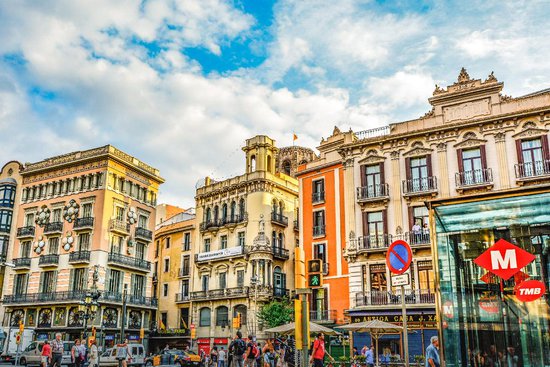Erudera's Complete Guide to Studying Art in Germany
Studying art in Germany means you will earn your knowledge and degree in a country with great potential to inspire. With its mountains, castles, cobblestone streets, small fairytale towns, and vibrant cities, it indeed provides a great environment for emerging artists. Apart from being a fascinating source of inspiration, Germany also provides an excellent destination to pursue an arts education. Its universities are consistently ranked highly, and its degrees are renowned internationally. There is just so much to look forward to if you plan on pursuing your art degree in Germany.
Here’s everything you need to know about studying art in Germany:
Reasons to Study Art in Germany
Scholarship Support
As a prospective art student in Germany, you may be eligible for financial assistance in the form of a scholarship in Germany. The German government and numerous other institutions and foundations in Germany provide financial support for students wishing to pursue an art degree in Germany. Organizations like the DAAD, Deutschlandstipendium, student loan services like BaföG, or various other smaller foundations provide financial assistance for students in need. There are plenty of ways to identify scholarship opportunities, mainly through organizations’ websites. Also, the Student/International Office at each university usually provides sufficient information regarding scholarships/funding options.
Ideal Environment for Aspiring Artists
Germany is an ideal location for aspiring artists. Why? Because it has a strong concentration of art galleries, especially in cities like Berlin, Leipzig, or Cologne. Art galleries are a great way for young artists to have representation. Art collectors from around the world travel to Germany, and exposure is a great benefit to an artists’ career. Besides, Germany is also home to a wide array of museum collections, where young artists can seek full or part-time employment as registrars or look after the artworks and collections. Germany is a cultural country where artists can seek inspiration, enrich their portfolios, create valuable connections, and gain experience in the art scene.
Affordable Country
Education, rent, and living expenses are comparatively lower in Germany than in many other European countries. Most public higher education institutions require no tuition fees, only a semestral administrative fee (typically no higher than €250/$305 per semester. Affordable education complements the affordability of the living expenses and rent. This can be beneficial for emerging artists who will find it necessary to rent studio spaces. Young artists who are self-employed can highly benefit from the cheap rent opportunities. Moreover, one of the main reasons to study art in Germany is that it is an innovative country that strives to keep young talent close.
Top Art Universities in Germany
Some of the top universities to study arts in Germany are:
- Berlin University of the Arts
- Bauhaus University, Weimar
- University of the Arts, Bremen
- Braunschweig University of Art
- The Alanus University of Arts and Social Sciences
- University of Fine Arts, Münster
- State Academy of Fine Arts, Stuttgart
- The Academy of Fine Arts, Leipzig
Art universities in Germany provide a diverse range of study programs. Berlin University of the Arts, for example, provides degree programs in Fine Arts (Painting, Sculpture and New Media), Bachelors/Master’s Teaching Degree with a Focus on Fine Arts (for aspiring art teachers), as well as a Master’s Program in Art in Context (for those who plan to apply their art in a social context).
Generally, prospective art students can choose from a variety of degree programs, such as Bachelor’s in Media Art and Design, Product Design, Visual Communication, etc., each of which typically has a subsequent Master’s program that builds upon the Bachelor’s degree. Colleges of Performing Arts offer degree programs in fields like Voice/Opera, Acting, Stage Design, Costume Design, Musical/Show, to name a few.
Requirements To Study Art in Germany
The admission requirements to study art in Germany are generally challenging. Art universities go through an extensive selection process, typically including an aptitude assessment, to measure the applicants’ artistic talent.
The academic requirements to study art in Germany include:
- Artistic talent (portfolio of your artistic work).
- University entrance qualification (Abitur or equivalent).
- German language proficiency (for German-taught programs).
- English language proficiency (for English-taught programs).
- For international students: Preliminary Documentation (VPD) by Uni-Assist.
International applicants are generally required to submit proof of language proficiency through a language certificate. The certificate must show that the applicant will fulfill the necessary language level by the time they enroll in the university (even if, at the time of application, the proficiency level is lower).
Application Process
German universities usually ask applicants to apply directly to the university through the university’s online portal. The application process to art school in Germany usually follows the steps listed below:
- Complete and sign the application form in the university’s online application portal.
- Submit the following documents (either by post or online, depending on the university):
- The application form,
- Curriculum Vitae and Letter of Motivation,
- Proof of language proficiency (German or English),
- Preliminary Documentation (VPD) by Uni-Assist,
- Work samples/artistic portfolio.
- Proof of application fee payment.
Specific requirements (such as language proficiency level, required documentation, or artistic portfolio requirements) depend on the respective university.
After receiving applications, universities contact the applicants and notify them whether they have passed the pre-selection procedure. Depending on the program (and university), students will then be invited to an entrance examination that might consist of a letter of reflection, artistic examination task, and interview.
Degree Duration: How Long Does It Take to Study Art in Germany?
Depending on the program, it takes approximately four years (8 semesters) to complete an arts degree in Germany. Master’s programs can either take one or two academic years (2/4 semesters) to complete, while doctoral programs in Art and Design usually take three years to complete (6 semesters).
Tuition Fees: How Much Does It Cost to Study Art in Germany?
Most state-run academies of art in Germany charge no tuition fees due to a regulation implemented in 2014. Students usually only have to pay an administrative fee per semester (around €250/$305). Students from non-EU countries wishing to study in the federal state of Baden-Württemberg will have to pay around €1,500/$1,800 per semester in tuition fees (Baden-Württemberg is the only federal state that applies tuition fees to its public universities).
Studying art at a private university in Germany may cost around €3,500/$4,250 per semester. Private universities do not receive any state funds; therefore, tuition fees depend entirely on the institution and may vary from one university to another.
Art Career Prospects in Germany
During art studies in Germany, you will obtain theoretical and practical knowledge and skill. You will have countless opportunities to develop your own style, ideas and even create your own artistic projects. Students go through a challenging but beneficial experience during art school in Germany, through which they learn, meet new people, and grow both personally and professionally. This allows them to turn their artistic talents into a successful career.
Many art graduates in Germany become self-employed and earn an income on a client basis. Art graduates may either work for art education services, art galleries, associations or even find employment in digital media, depending on their artistic aspirations. Considering Germany’s economy is one of the strongest in Europe, art professionals can expect to have decent earning potential in Germany. People who work in the creative industries also receive financial assistance from the German government in the form of grants.





